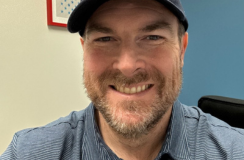fter working in the New York investment banking world, Chris Williams moved to California to work in private equity for TPG in 2015.
While buying real estate businesses for the investment firm, he enrolled in Stanford’s Graduate School of Business. Stanford is known as the hub of the traditional search fund model, and Chris was instantly taken with the concept.
A summer internship at a search-acquired software company in North Carolina convinced him that he wanted to acquire a business through a search fund, but he wanted more independence than the traditional search fund model.
“Every searcher will say that ultimately they got a little lucky, but you have to do a lot of work to put yourself in the position to get lucky.”
Instead of raising capital right away, he carefully selected a few investors to work with who could also mentor him through his search.
At first he planned to raise a permanent equity fund to execute multiple acquisitions over about 10 years, but instead he decided to focus on acquiring one company first and worry about the rest later.
That business turned out to be System Six, a bookkeeping company he first reached out to in 2020. Chris was interested in traditional search at the time, but System Six wasn’t big enough for that type of acquisition.
Some months later, the owner, now more eager to sell the business, reached back out to Chris to ask about a few paths he was considering.
At that point Chris’s requirements for acquisition had changed, and he moved forward with acquiring System Six himself. He became owner in July 2021.
In this episode, Chris compares the appeal of traditional and self-funded search models, suggests pathways for those considering going into search, and talks about the appeal of bookkeeping and finance back office as an industry for acquisition entrepreneurs.
Check out:
✳️ Top takeaways from the episode
✳️ Episode highlights with timestamps
Acquisition Entrepreneur: Chris Williams
💡 Key quote: “It’s important for searchers to keep in mind that it can be super lucrative to buy, run, grow, ultimately sell — or perhaps cash flow for an even longer period of time — a small business.”
💵 What he acquired: While getting his MBA at Stanford, Chris became intrigued with acquiring a business via a search fund. Early in his search he approached the owner of a bookkeeping company about the possibility of a sale. It didn’t work out then because Chris was looking for a larger acquisition using a traditional search fund. But when the owner contacted him months later, Chris had shifted his search criteria and was then open to a smaller deal as a self-funded search using SBA funding. He acquired System Six Strategic Bookkeeping & Analysis in July 2021.
👋 Where to find him: LinkedIn

Acquisition Tips From the Episode
Top takeaways from this conversation
💎 Be open to all models of search.
After pursuing a traditional search fund for a while, Chris realized he wanted to buy a smaller business and wanted a more independent process. He was fortunate enough to be in a position to do a self-funded search instead.
Although traditional search requires you to work with a larger group of investors and a board of directors with the power to fire you, it also offers more financial stability in the form of a salary while you conduct the search.
Self-funded search will enable you to work with a smaller group of investors that you are likely to form close relationships with. You’re only accountable to yourself, but the downside is that you don’t receive a salary and have to fund all the deal and diligence costs yourself.
“It costs money to buy a business,” says Chris.
🍀 Successful searches require work and luck.
The stars have to align for you to find a deal that meets your criteria, and the owner is open to selling at that moment, and they choose you from among their other options (which are likely numerous).
To increase your chances that the stars do eventually line up in your favor, you have to put in the work: systematic outreach & follow-up, industry research, engaging with brokers.
“Every searcher will say that ultimately they got a little lucky, but you have to do a lot of work to put yourself in the position to get lucky.”
🚪 Keep the door open with owners.
It’s a pattern seen time and again among Acquiring Minds guests:
They have an initial conversation with an owner about acquiring the owner’s business, but it doesn’t pan out. Months or even years pass, things change, and the searcher and business owner get back in touch, and now the timing is right on both sides — and the acquisition happens.
Nothing came of Chris’s initial conversation with his seller. But the seller reached back out to him for advice months later, and that second round of conversations evolved into the acquisition.
So keep in touch with owners you’ve established relationships with, and help them if they ask for it. It’s one of the ways you can increase your chances of getting lucky.
Episode Highlights
Inflection points from the show
[1:27] A very recent acquisition: Chris acquired bookkeeping company System Six Strategic Bookkeeping & Analysis in July 2021.
[2:29]: Cutting his teeth on the real estate side: He was an investment banker in New York for two years and then moved to California in 2015 to work in private equity, buying real estate businesses for his employer TPG.
[4:43] The mecca of search: Stanford’s Graduate School of Business is known as the hub of the traditional search fund model. Chris had never heard of a search fund before he went to Stanford, which influenced his path heavily.
[6:52] There’s something about search: When he entered graduate school, he had the vague notion that he might want to go into operating. He had spent a few months helping with standing up processes and systems for a portfolio company of his employer’s. He really enjoyed working across teams and getting to know all the players. When he was introduced to search at the beginning of his graduate work he saw parallels that resonated with him, so he devoted much of his graduate work to exploring search funds.
[8:44] Golf, not lemonade: Growing up, Chris was not the stereotypical future entrepreneur with a lemonade stand. But he played competitive golf, an individual sport that prepared him for the solo path of entrepreneurship.
[9:42] Niche down early: Business school is a great time to explore career paths, but Chris says you need to choose a path sometime in the first year so you can go deep for the remainder of your two years rather than spreading yourself too thin.
[13:19] His kind of search: Chris wanted something more “personal” than the traditional model, in which you typically have lots of investors and more independence. He preferred a smaller, close-knit group of investors to collaborate with.
[15:52] Downsizing: Chris got more comfortable with the idea of a smaller acquisition and SBA funding. He didn’t set his exact target size for an acquisition at the outset, and in the meantime, he had two great mentors (his investors) to work with and enough money to support himself while the team put together the right capital structure.
[17:38] Pros and cons: Raising a traditional fund offers more interim financial stability for searchers, but it’s not without its challenges. Typically you’re dealing with a larger group of more sophisticated investors who keep you accountable with reporting requirements and KPIs. This can also be a pro, as it forces you to “level up” your game to meet such expectations.
[19:01] Traditional search 101: Generally, when you acquire a business in a traditional fund you get 8.33% equity at the time of acquisition. Chris breaks down ownership by the numbers.
[20:38] SBA structure: When you borrow from the SBA, you can’t have a board of directors and are not fireable because you’re the “warm body” signing the personal guarantee.
[21:20] Valued input: Though Chris’s investors don’t have board rights over him, he gives them reports and seeks their advice regularly as if they were a board of directors.
[24:46] Searchflow: Chris spent 20-30 percent of his time getting in front of small business brokers in the California and Tahoe regions. He spent more time on proprietary outreach and studying industries to determine fit. He spent the remainder of his time on email outreach to potential sellers.
[27:00] An acquisition evolves: Chris first contacted the former owner of System Six in the early months of his search. An acquisition didn’t happen then, but a few months later, when Chris’s criteria for acquiring a business had changed, the owner reached back out to him because he was considering an exit and sought Chris’s counsel. His timing couldn’t have been better.
[30:12] System Six by the numbers: System Six is a tech-enabled back office on the financial side, for small and medium-sized businesses. It serves roughly 150 clients, has revenue of $3 million, and 35-40% EBITDA margins. Because it’s a fully remote business, it saves money on real estate costs.
[32:39] Recurring revenue: A lot of Chris’s competitors charge clients a monthly retainer. System Six charges weekly, as opposed to a contracted retainer model. This creates a powerful cash flow dynamic that pulls in money ahead of Chris’s payroll obligations. At roughly 10-20% per year, the churn rate is relatively low compared to other industries.
[38:21] Quickbooks ecosystem as acquisition opportunity: Chris sees an M&A opportunity in the tens of thousands of bookkeepers listed in the Quickbooks directory. Soon-to-retire bookkeepers have customer lists that can be acquired, and to a lesser extent, entire firms are potential acquisitions.
[46:02] Months 1-6: Since acquiring the business, the first three months have been devoted mostly to updating systems, workflow, and tech, and Chris has spent about half his time doing sales. He wants to use his second quarter as owner to hire a salesperson so he can concentrate on exploring new verticals.
[48:09] The right kind of exit: System Six’s owner had proactively removed himself from the business over his last several years. You want to acquire a business from someone like System Six’s previous owner, who was happy with its level of cash flow and was making a conscious decision to sell it.
[53:24] Search pathways: There is no one way to conduct a search, but here are some Chris recommends: go to work for an accelerator with working systems and processes for you to run; get a C-level job via a private equity firm; or acquire a very small business at first and do a roll-up over time. Evaluate each against your personal goals and preferences. Don’t lock yourself into a structure before you choose the path you’re going to follow. This is how Chris got comfortable doing an SBA deal and taking on the risk that comes with it.
[55:41] Early keys: In the first six months, the most important things Chris advises are to make sure half the company and/or clients don’t leave and, if you’re a self-funded searcher with an SBA loan, to make sure you can meet your debt payments.
Links & Mentions
✅ System Six Strategic Bookkeeping & Analysis
✅ Forbes article on ScaleFactor’s claims about AI
✅ Stanford University Center for Entrepreneurial Studies: Search Fund Primer













%20-%20thumbnail.png)






%20-%20thumbnail.png)



%20-%20thumbnail.png)

.png)




%20-%20thumbnail.png)















%20-%20thumbnail.png)



























































